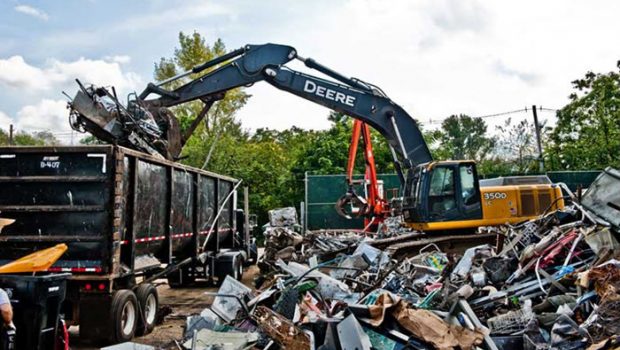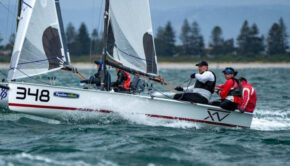Working at the Salvage Yard
Published on July 18th, 2018
We all have those races when we get caught behind early and are forced to play catch up. Typically a strong regatta finish comes down to how well we salvage those races, so mastering the skills is a crucial tool in the tactical toolbox. In her column for SpinSheet magazine, Kim Couranz reflects on the concepts that helped her succeed at a recent regatta.
Don’t. Freak. Out.
This is waaaaay easier said than done, but focusing on how you got to where you are (OMG how did we have such a bad start? Why did they start us in such a big lefty shift? Why did that boat stuff it up so high?) rather than on how you want to get out of where you are only makes you slower and grumpier.
Every boat counts.
Remember that, especially in fleet racing, your overall regatta standing really is a math equation, and minimizing your points is the goal. While we never had any bullets, we never had any stinkers. Focusing on grinding down boats and not making any rash decisions can pay big dividends.
Just before one leeward mark rounding, having made some good comeback moves on that leg, we were close to getting an overlap with another boat. If we had gotten an overlap, we would have rounded inside and gained that one boat. If we had not gotten in and tried to push inside anyway, we would have fouled; if we kept pushing until we rounded, it would have been a mess. And we could have lost five or more boats. The math said, “Play it simple, and don’t risk losing five boats—instead, have a good rounding and pass that boat upwind.” So we did.
Dirty air requires tough decisions.
But you have to make those decisions. After a really bad start, you’re challenged not only by the things you traditionally have to face on the race course (where are the puffs, what way is the wind phasing) but also by lots of dirty air. Everyone who got a good start is likely sailing on the lifted tack or toward the best breeze. Seize control of your own destiny.
None of your choices will be optimal, but making no decision at all and floundering along with no intention is even worse (and remember, every boat counts).
It may very well be that sailing in dirty air on the lifted tack is the right thing to do. If that’s the case, look for opportunities to do two quick tacks to get yourself in slightly cleaner air on the lifted tack. It may be that the air is so dirty on that optimal tack that you need to ditch out and sail the headed tack, in cleaner air, in search of a better lane. That’s okay too.
Boatwork and preparation are key.
Riding the hairy edge of salvaging a regatta is not the time to have a boat breakdown. Take the time to make sure your boat and gear are in good condition so you can focus on the task at hand: consistently grinding back rather than making on-the-water repairs. Good boat prep can also ensure that you can rely on your boatspeed, rather than worrying about it (because you hadn’t taken the time to polish your hull, or something silly).
Be ready when duty calls.
Everyone has bad starts; it’s how you respond to those starts that will affect your regatta. Be prepared, take a deep breath, and make decisions that will help you maximize gains and minimize losses. It won’t happen in the blink of an eye, but you’ll start climbing out of that hole. Salvage on!









 We’ll keep your information safe.
We’ll keep your information safe.